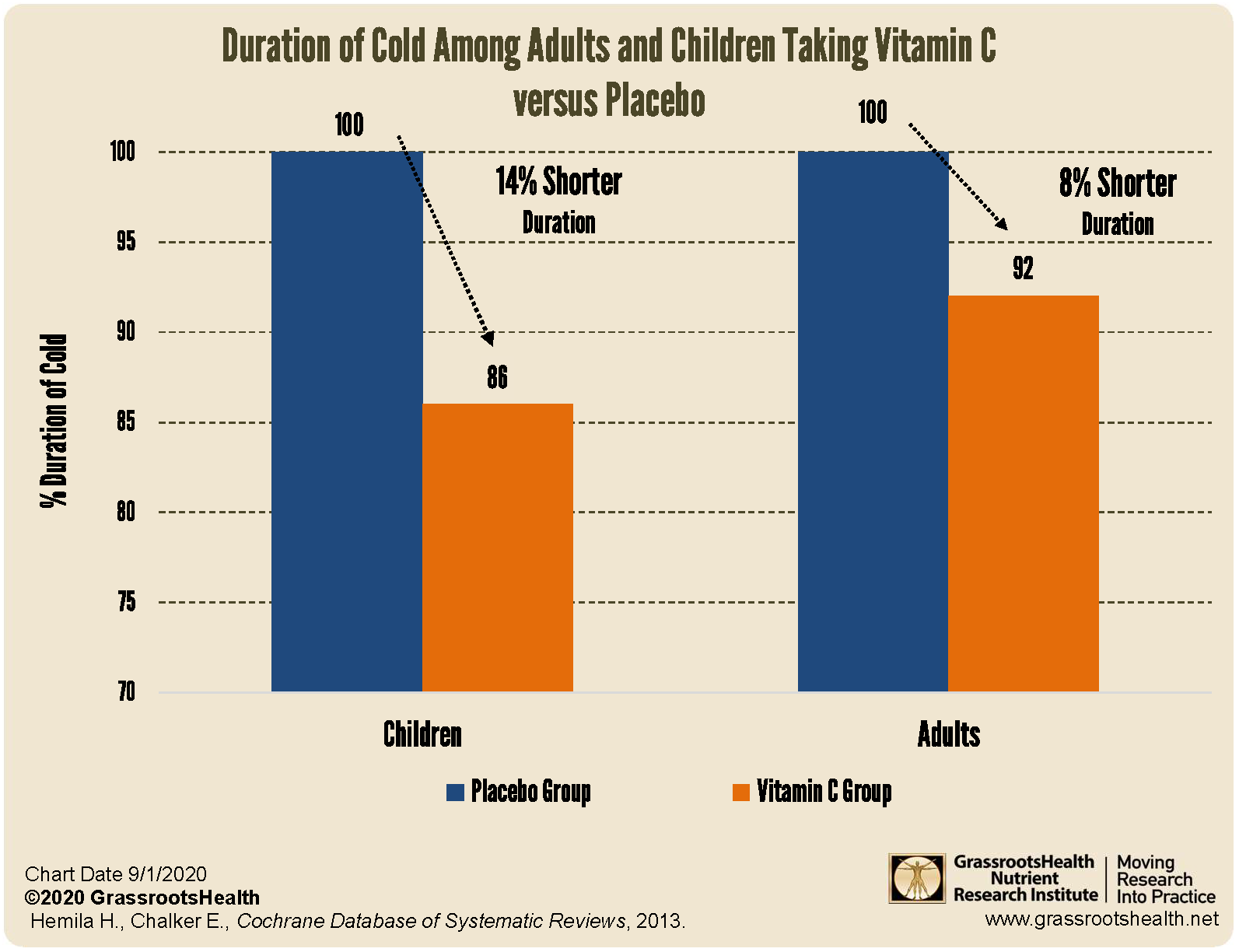Published on September 2, 2020
 Vitamin C has been well known for decades as an important immune boosting nutrient that can help fight the flu and the common cold. One of the major roles of vitamin C is as an antioxidant, a role that is important for protecting cells of the immune system from damage due to oxidative stress during an infection. An analysis of GrassrootsHealth data from October of 2019 showed that the percent of participants who experienced the flu in the prior 6 months was 32% lower for those who reported that they usually took supplemental vitamin C compared to those who did not (P=0.009). For colds, it was 9% lower (P=0.14).
Vitamin C has been well known for decades as an important immune boosting nutrient that can help fight the flu and the common cold. One of the major roles of vitamin C is as an antioxidant, a role that is important for protecting cells of the immune system from damage due to oxidative stress during an infection. An analysis of GrassrootsHealth data from October of 2019 showed that the percent of participants who experienced the flu in the prior 6 months was 32% lower for those who reported that they usually took supplemental vitamin C compared to those who did not (P=0.009). For colds, it was 9% lower (P=0.14).
What does the research say about vitamin C and common cold symptoms?
A meta-analysis by Hemilä and Chalker reviewed data from 29 placebo-controlled trials involving 11,306 participants who had been taking at least 0.2 g (200 mg) of vitamin C per day for periods ranging from 2 weeks to 5 years. The authors made the following conclusions from the data:
- Overall, there was a modest but consistent reduction in the severity of cold symptoms among those taking regular vitamin C (they stayed home from work/school less)
- The duration of colds was reduced by 8% among adults and 14% among children who took vitamin C regularly
- Vitamin C supplementation did not seem to reduce the risk of getting a cold in the general population, but for those who participated in certain heavy physical exercises (such as skiing and running marathons) the risk was cut in half!
- There were only a few trials that gave high doses of vitamin C after the onset of cold symptoms the findings of which did not show a consistent effect on cold duration or symptoms but studies in children that may experience more benefit are lacking. However, one large trial in adults reported benefit from 8 g of vitamin C given after onset of symptoms.
How safe is vitamin C?
Vitamin C supplementation is extremely safe. Doses of vitamin C up to 10 grams per day (10,000 mg/d) have been provided without causing any toxic or detrimental health effects. The tolerable upper intake level (UL) for vitamin C was set at 2,000 mg/d to prevent symptoms of diarrhea and gastrointestinal upset. These side effects can be minimized and absorption increased by dividing vitamin C doses over the course of a day and/or by gradually increasing the dose to bowel tolerance (increase the vitamin C dose by 500-1,000 mg/d until loose stools are encountered then reduce the dose slightly).
Better Results when Taken Together
Nutrients work synergistically in order to carry out specific functions within the body. For example, we have recently discussed how different immune cells rely on a variety of nutrients, including vitamins D, C, B6, B12, zinc, and magnesium, in order to carry out their actions in an immune response. Without these necessary nutrients, immune function may be hindered.
In order to demonstrate the combined effect of nutrients, GrassrootsHealth analyzed participant data to see if vitamin C intake in combination with vitamin D level and the Omega-3 Index had an even greater effect on cold and flu incidence. What we found was that the percent of participants who experienced the flu in the prior 6 months was 72% lower for those with a vitamin D level at or above 40 ng/ml who also had an Omega-3 Index at or above 8% and also reported that they usually took supplemental vitamin C compared to those with a vitamin D level less than 40 ng/ml and an Omega-3 Index below 8% who did not report usually taking supplemental vitamin C (P=0.005). For colds, it was 21% lower (P=0.17).
Nutrients Work Together for Immune and Overall Health!
Do you know your own nutrient levels? Do you know your levels of inflammation? Could getting more of certain nutrients help to decrease your levels of inflammation, and improve your immune response? Find out by testing your vitamin D, omega-3s, magnesium and other essential elements (including copper and zinc), as well as your inflammation levels, with the new Immune Boost home test kit offered by GrassrootsHealth. Measuring levels is the only way to know if you are supporting your immune system and whether additional changes should be made, with supplementation, dietary changes, or both.
Are You Getting Enough Vitamin D to Help Yourself?
We’re in a time of great crisis that could be greatly affected by making sure you and everyone you know has a serum level of at least 40 ng/ml. Help us help you.
Do you know what your vitamin D level is? Be sure to test today to find out, and take steps to keep it within a target of 40-60 ng/ml or 100-150 nmol/L! Give your immune system the nutrients it needs to support a healthy you and protect yourself from unnecessary diseases, especially COVID-19.
Through GrassrootsHealth Nutrient Research Institute, you can also test your essential elements magnesium, copper, zinc and selenium, toxins such as lead, mercury and cadmium, as well as your omega-3 levels, inflammation levels and thyroid stimulating hormone (TSH) level. Find out your levels today! Log on to the test selection page (click the link below) to get your tests and see for yourself if your levels can be improved.
Make sure you track your results before and after, about every 6 months!
How can I track my nutrient intake and levels over time?
To help you track your supplement use and nutrient levels, GrassrootsHealth has created the Personal Health Nutrient Decision System called
For each specific supplement, you can track what days you take it, how much, and many other details. This will help you know your true supplemental intake and what patterns of use work for you to reach and maintain optimum nutrient levels. Check it out today!








